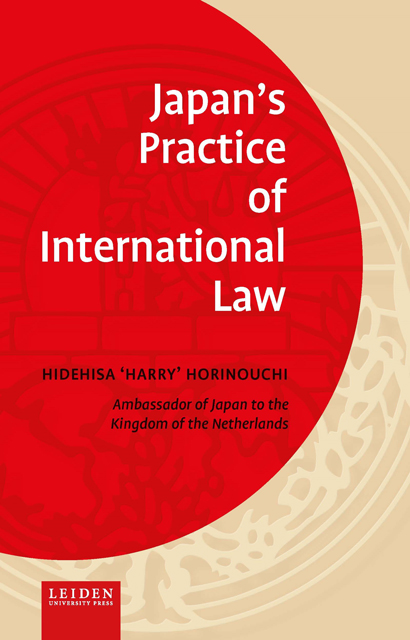Book contents
- Frontmatter
- Dedication
- Contents
- Foreword
- Chapter I Security and the Right of Self-Defense: 8 Hours on September 11
- Chapter II The End of the War: How World War II ended in Asia
- Chapter III The Remnants of War: Chemical Weapon: Poisonous Gas Accident in Qiqihar City, Heilongjiang Province
- Chapter IV Waters: Spy Vessel Incident in the Southwest Waters of Kyushu
- Chapter V Consular Affairs: Japan-China Consular Agreement:* Trajectory from the Shenyang Consulate-General Incident
- Chapter VI Human Rights of a Hijacker: CAAC Flight Hijacking Incident
- Epilogue
Chapter III - The Remnants of War: Chemical Weapon: Poisonous Gas Accident in Qiqihar City, Heilongjiang Province
Published online by Cambridge University Press: 12 January 2023
- Frontmatter
- Dedication
- Contents
- Foreword
- Chapter I Security and the Right of Self-Defense: 8 Hours on September 11
- Chapter II The End of the War: How World War II ended in Asia
- Chapter III The Remnants of War: Chemical Weapon: Poisonous Gas Accident in Qiqihar City, Heilongjiang Province
- Chapter IV Waters: Spy Vessel Incident in the Southwest Waters of Kyushu
- Chapter V Consular Affairs: Japan-China Consular Agreement:* Trajectory from the Shenyang Consulate-General Incident
- Chapter VI Human Rights of a Hijacker: CAAC Flight Hijacking Incident
- Epilogue
Summary
Introduction
On August 9, 2003, a commemorative reception was held at the Great Hall of the People to celebrate the 25th anniversary of the conclusion of the Japan-China Peace and Friendship Treaty in Beijing, China. Chief Cabinet Secretary Yasuo Fukuda visited China from Japan to attend the reception with the Chairman of the Standing Committee of the National People’s Congress Wu Bangguo. On the same day, Chief Cabinet Secretary Fukuda met with President Hu Jintao and Chairman Wu Bangguo, and on the following day, he met with Prime Minister Wen Jiabao. At this meeting, Prime Minister Wen called for the Japanese side to take appropriate measures in the case where more than 30 people were injured by the abandoned chemical weapons of the former Japanese army in Qiqihar City, Heilongjiang Province, China. In response to this statement, Chief Cabinet Secretary Fukuda replied that Japanese experts were currently investigating the incident and if the facts became clear, the Japanese Government would take appropriate measures.
On October 20, the Japan-China summit meeting was held in Bangkok, Thailand. In this meeting, about two months after the meeting in Beijing, President Hu Jintao told Prime Minister Junichiro Koizumi that the response to this incident was agreed between the office levels of both countries.
In this paper, I would like to clarify how the parties concerned in both countries acted in response to an unprecedented incident for both Japan and China, namely the occurrence of large-scale damage caused by the abandoned chemical weapons of the former Japanese Army, and what kind of understanding had brought the two sides to the final solution on this matter. The author was involved in the response to the accident and the discussions with the Chinese side as the director of the China Division, Asian and Oceanian Affairs Bureau of the Ministry of Foreign Affairs of Japan at the time of the accident. However, the views expressed in this paper do not represent the views of the government or the Ministry of Foreign Affairs, except for direct citations such as parliamentary responses and external announcements.
First appearance of the paper: “Poisonous gas accident in Qiqihar City, Heilongjiang Province”, Yushindo-kobunsha “Agenda for International Law in the 21st Century: Professor Ando Nisuke Jubilee Publishing”, July 2006.
- Type
- Chapter
- Information
- Japan’s Practice of International Law , pp. 41 - 70Publisher: Amsterdam University PressPrint publication year: 2022



